Crucial M550 Review: 128GB, 256GB, 512GB and 1TB Models Tested
by Kristian Vättö on March 18, 2014 8:00 AM ESTPerformance Consistency
Performance consistency tells us a lot about the architecture of these SSDs and how they handle internal defragmentation. The reason we don’t have consistent IO latency with SSD is because inevitably all controllers have to do some amount of defragmentation or garbage collection in order to continue operating at high speeds. When and how an SSD decides to run its defrag or cleanup routines directly impacts the user experience as inconsistent performance results in application slowdowns.
To test IO consistency, we fill a secure erased SSD with sequential data to ensure that all user accessible LBAs have data associated with them. Next we kick off a 4KB random write workload across all LBAs at a queue depth of 32 using incompressible data. The test is run for just over half an hour and we record instantaneous IOPS every second.
We are also testing drives with added over-provisioning by limiting the LBA range. This gives us a look into the drive’s behavior with varying levels of empty space, which is frankly a more realistic approach for client workloads.
Each of the three graphs has its own purpose. The first one is of the whole duration of the test in log scale. The second and third one zoom into the beginning of steady-state operation (t=1400s) but on different scales: the second one uses log scale for easy comparison whereas the third one uses linear scale for better visualization of differences between drives. Click the buttons below each graph to switch the source data.
For more detailed description of the test and why performance consistency matters, read our original Intel SSD DC S3700 article.
 |
|||||||||
| Crucial M550 | Crucial M500 | Intel SSD 730 | SanDisk Extreme II | Samsung SSD 840 EVO | |||||
| Default | |||||||||
| 25% Spare Area | - | ||||||||
I can't say I'm very pleased with the IO consistency of the M550. There is a moderate increase (~4K IOPS vs 2.5K in M500) in steady-state performance but other than that there isn't much good to say. All the other higher-end drives run circles around the M550. I should note that the M550 does have considerably less over-provisioning than the other drives but even at 25% OP the results aren't pretty. There is huge variation in performance and the graphs with additional spare area certainly look quite abnormal, but the IOPS is still mostly below 5000. There are peaks of over 50K IOPS too but personally I would prefer a steady line (like the SSD 730) instead of this constant up and down. In client workloads the variation in IOPS isn't as critical as in the enterprise (where predictable performance is a must) but there can be an impact on performance in IO intensive scenarios.
 |
|||||||||
| Crucial M550 | Crucial M500 | Intel SSD 730 | SanDisk Extreme II | Samsung SSD 840 EVO | |||||
| Default | |||||||||
| 25% Spare Area | - | ||||||||
 |
|||||||||
| Crucial M550 | Crucial M500 | Intel SSD 730 | SanDisk Extreme II | Samsung SSD 840 EVO | |||||
| Default | |||||||||
| 25% Spare Area | - | ||||||||
TRIM Validation
To test TRIM, I took a secure erased drive and filled it with sequential data. Then I tortured the drive with 4KB random writes (QD32) for 30 minutes followed by a TRIM command (quick format in Windows). Finally I measured performance with HD Tach to bring you the graph below:
And as you should expect, TRIM works.











100 Comments
View All Comments
hojnikb - Wednesday, March 19, 2014 - link
Oh snap, i forgot to reply to @beginner99 :)emn13 - Wednesday, March 19, 2014 - link
The conclusion of this article is at odds with the benchmarks it includes. There's just a 20% performance difference on the heavy-load test between the 840 EVO and M550 1TB drives, less in lighter workloads. I don't believe a 20% performance difference is perceptible in practice, unless you're really doing long-duration purely disk-limited batch processing, and even then it's not exactly a very interesting difference.The appropriate conclusion here is: *any* reasonably modern SSD is more that fast enough that even a heavy workload won't cause user-noticable performance differences. It just doesn't matter. Other factors (e.g. power consumption, power loss protection, price, reliability, support) are what matter.
The article's conclusion simply doesn't make sense given the numbers shown here.
hojnikb - Wednesday, March 19, 2014 - link
Well, there are some reasonably modern ssds, that user WILL notice the difference. Crucial V4 for expamle..Kristian Vättö - Wednesday, March 19, 2014 - link
Okay, I'll let Anand know that we no longer need to do reviews because all modern devices are already capable of Facebook, email and text processing.In a more serious note, it's true that for light users any modern SSD is fine and that is what I said in the final page:
"If you're a light user and price is the key purchase factor, then the M500 suffices and saves you money."
And that is the biggest problem I have with the M550. The M500 already does it for the mainstream user group and to be honest it is the drive I would buy given the current prices.
However, the M550 doesn't cut it for the enthusiast/professional group who want the best IO performance. It does the job for sure but the enthusiast/professional kind of people usually like the idea of having the best money can buy, even if the differences in real world aren't that big. On the other hand, that's also the user group that can actually take advantage of the extra performance.
I would argue that there is no middle ground in the SSD market. It's either the mainstream market where price is all that matters and that's where the M500 fits in perfectly. The high-end market is where the performance and features are the main element but the M550 isn't competitive there. Everything in the middle are kinda purposeless - some people will always buy them but they don't have any clear inducement to make them alluring.
P.S. Don't take the first line too personally or seriously. Sometimes the comments just make me feel like everything is already enough for everyone and we don't need improved hardware.
hojnikb - Wednesday, March 19, 2014 - link
Yeah exactly. m550 really seems kinda redundant (not implying, that better performance isn't good), considering its suppost to be a high performance drive, yet it really compets with mainstream at best.I think crucial need to work on firmware department, because as we've seen, there's lots to be squeezed out of this marvell controler. They already have great nand, they just need to make firmware better and they could easily compete in the highend segment.
Well atleast thats what i think anyway..
Cerb - Sunday, March 23, 2014 - link
Given that read and write latency is consistently higher than other SSDs, I'd bet much of the speed limitations are due to RAIN, which has to be handled in software by the SSD's controller. If so, newer faster controllers are what it would take to improve the speed by any great amount, without sacrificing that feature.emn13 - Wednesday, March 19, 2014 - link
I'm not saying you shouldn't review these things - I'm extremely interested in the results of these reviews. I'm saying that your own results don't back up your conclusions. It's not just light workloads where the difference is hard to notice - the anandtech 2013 "destroyer" - IIRC which writes a considerable amount, quite a bit more that a light, normal desktop workload (or frankly even a fairly heavy desktop workload) only shows a 20% performance difference. The performance consistency numbers at the steady state are just below 5000 iops, and that's actually slightly better than the EVO 840.Notably, there *are* SSD's which are quite a bit slower, and I'm sure there will be SSD's (or are, if you pay enough) that outclass the M550 - but I'm just not seeing that in these results.
Sorry if I came across as ungracious - it's a little unfair in that I'm commenting now in that it seems I think the coverage is poor. But I'm commenting now, because this is one of the rare articles where I think anandtech's conclusions aren't reasonable. I love your coverage, particularly of SSD's, and have gladly learned a lot from all the in-depth analysis you've done.
So please don't take this personally (I may have exagerrated) - I really don't understand how given essentially equivalent performance to the 840 EVO in practical terms (and slightly better @ steady state) you can call the performance all that disappointing. It's not a top-performer; but then, it's clearly aimed at the larger capacity/lower-price, and then I really don't see how this conclusion stacks up.
emn13 - Wednesday, March 19, 2014 - link
Hmm, I've gotta admit however that the smaller variants are a lot more disappointing. I'm kind of surprised how *much* slower they are - the 256GB version is less than half as fast on the destroyer, which is really will be noticable :-).Kristian Vättö - Wednesday, March 19, 2014 - link
Oh, absolutely not. Justified feedback like yours is always welcome :)I guess the key here is that I was expecting this to be a high performance drive because that's what Crucial was touting when they briefed us. Obviously I expected the performance to be close to drives like SanDisk Extreme II and OCZ Vector 150 because those are what I categorize as high performance drives. However, what we got is a drive with mediocre performance that didn't meet the expectations I had in my mind, so I can't say I'm satisfied.
That doesn't mean the M550 is bad because the price is very competitive but I still think it's rather redundant because the M500 is even more competitive in price. If the M550 was to replace the M500, then the scenario (and hence conclusion) would be different but as it stands the M500 will continue to be the king of value.
The EVO is different in this regard because it was always supposed to be a value drive and Samsung has the 840 Pro to cater the high performance market.
nick2crete - Thursday, March 20, 2014 - link
Kristian ,do you think that these performance issues can be minimized/fixed with new firmware(s) from Crucial ?